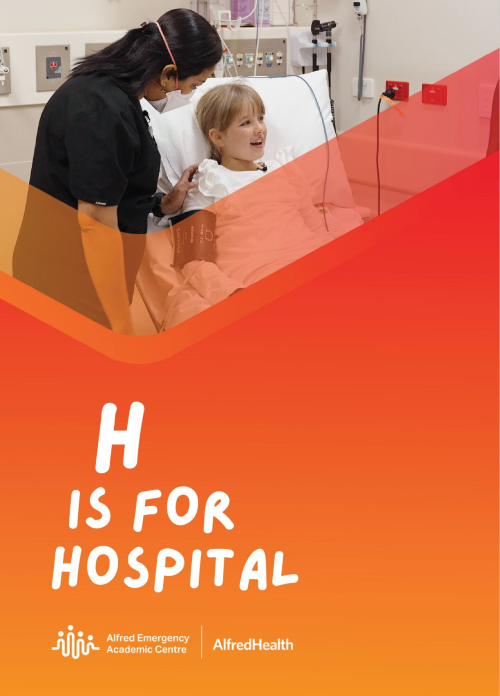Your journey through Emergency
A summary of what to expect when you come to Emergency.
Streaming
Upon your arrival in Emergency, you may be greeted by a Ward Clerk or the Streaming Nurse. The role of this nurse is to assess your medical condition and determine the urgency for a doctor's assessment and treatment. You will be allocated a triage category and then asked to wait to see a doctor.
It is important to note that you must not eat or drink anything from the time you arrive in Emergency until you are otherwise advised by your doctor or nurse.
It is also important that you bring all relevant paperwork, including any letters or correspondence from you GP, to assist in determining your health status and urgency category.
Register
You will be registered by the Ward Clerk at the reception desk and the details collected are used to identify you. You will be asked for your Medicare card number and whether you have private health insurance. Having these details is helpful to the clerical staff.
Overseas patients may have to pay for medical care provided. The Emergency Department has electronic payment facilities and an ATM is on site. Australia's Medicare system has reciprocal medical care agreements with Finland, Ireland, Italy, Malta, The Netherlands, New Zealand and the United Kingdom. Find out more about payments.
Wait
After you have been seen by the Streaming Nurse you will need to wait to be seen by a doctor. You may be asked to take a seat in the waiting room or you may be placed on a trolley and taken into one of the clinical areas.
Patients who are on trolleys or arrive by ambulance are not necessarily seen first. Whilst in the waiting room, please direct all concerns to the Streaming Nurse. If you have been taken through to one of the clinical areas, please direct all concerns to the nurse that has been allocated to care for you.
Observation
When you have been allocated a cubicle, a nurse will often be the first to see you. You will be asked to undress and get changed into a patient gown to assist in your assessment.
Your clothes will be placed in a bag under your trolley. Staff are very sensitive about modesty and will respect this at all times. If you have any concerns then please discuss these with your nurse.
The nurse will take routine observations (pulse and blood pressure). If needed, the nurse will also perform appropriate investigations (blood samples, ECG) and some can organise x-rays before you are seen by other staff, such as a doctor, nurse practitioner or physiotherapist. This will save time and help to make the correct diagnosis regarding treatment.
The cubicle area is small and crowded so visitors are restricted inside Emergency. Your visitors will be asked to wait in the waiting area until nursing and medical staff have completed their care and assessment.
Belongings
Patients are responsible to ensure their belongings are kept with them.
We strongly encourage that patients do not bring valuables into the ED. Alternatively, patients should ask their friends or relatives to take any valuables home if they are not essential to the person's hospital stay.
If arrangements cannot be made for valuables to be taken home, the patient should arrange for the valuables to be kept securely with hospital security. The nurse can assist in arranging this.
Seeing a clinician
As soon as possible, a clinician (such as a doctor, nurse practitioner or physiotherapist) will assess you. You will be asked many questions including those that other clinicians already asked. It is important to tell the clinician:
- the reason for coming to the hospital
- current medical problems
- past medical problems and operations
- current medications (a complete list is essential)
- any allergies to medications
Please be honest in answering any questions asked as the information you give will assist the clinician to make the correct assessment and institute the correct management.
Our aim is to keep you informed of your medical condition and ongoing management.
Remember that any information you give is strictly confidential and will not be passed on to any other person in accordance with Australia's privacy laws.
Investigation
Once the clinician has taken your history, you may require further investigations. If you are unsure why an investigation is being undertaken please ask the doctor or nurse caring for you. Investigations may include:
- Blood samples - blood will be taken from a vein in your arm or hand using a needle. If you need to be given medication through a vein, then a very small plastic tube (cannula) will be left in the vein
- X-rays
- CT scans
There may be a wait to have some investigations due to the number of patients requiring them.
Once the results of the investigations are available, the doctor will inform you of the result and explain your ongoing management plan. If you have any questions then please ask the doctor or nurse caring for you.

The Alfred Emergency & Trauma Centre
The Alfred Emergency & Trauma Centre, or 'Emergency' as it is known, operates 24 hours a day and is one of the main service providers to the people of Victoria, providing timely, quality care for the acutely unwell and injured.
Find out more
Sandringham Emergency
Sandringham Hospital Emergency provides a 24 hour, 7 days a week service to the Bayside community for all emergencies or when a person becomes suddenly unwell or is injured.
Find out more
H is for Hospital
The idea of going to hospital can be scary. In a short video and storybook, we show some of the typical things a child will experience on their journey through Sandringham Hospital Emergency Department.
Find out more